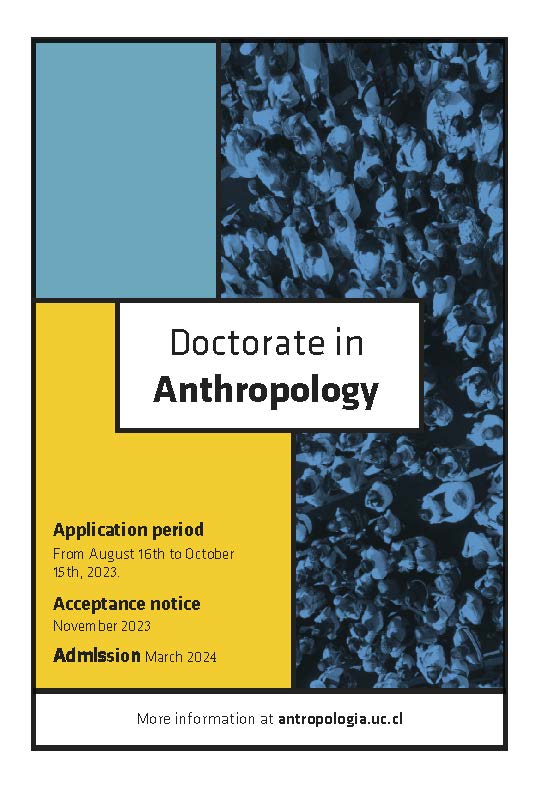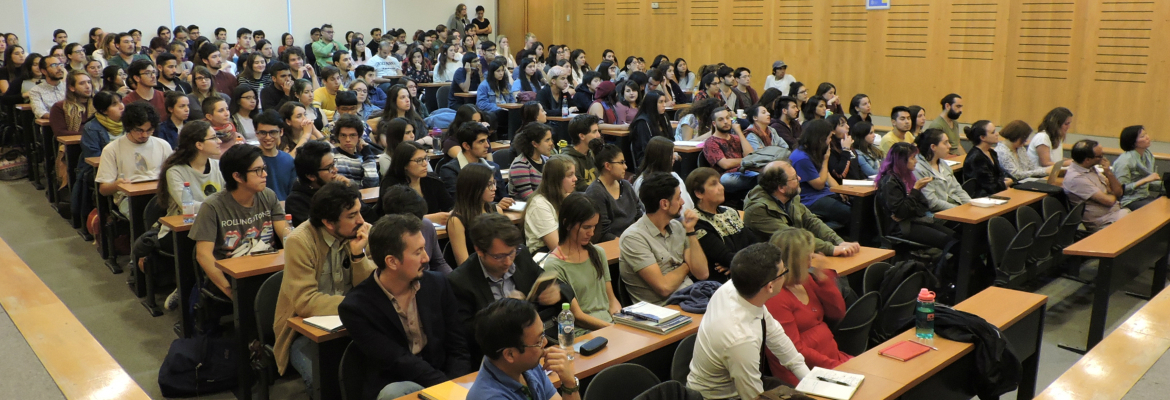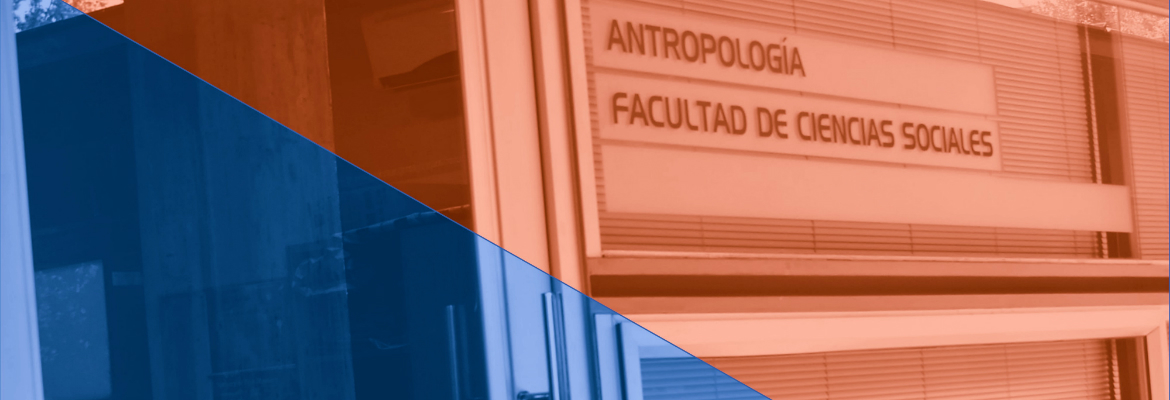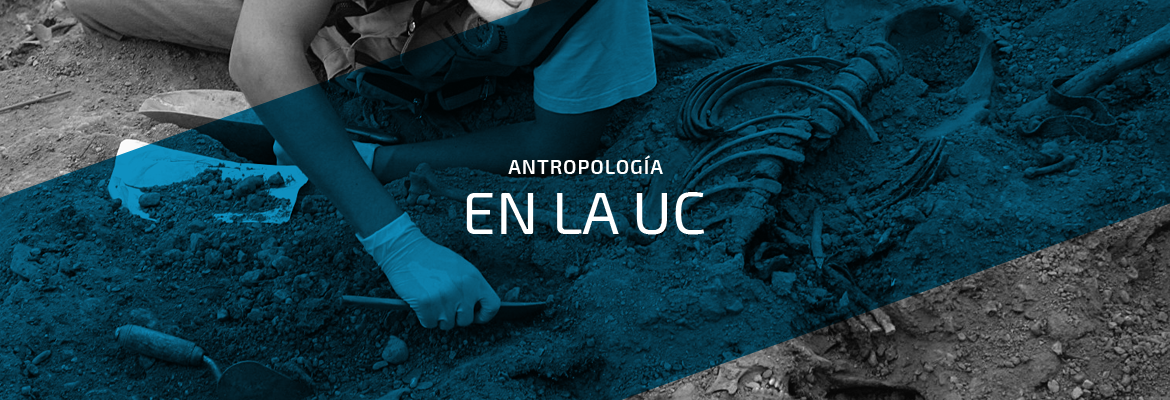

Summary
Spanish version
Program Name: Doctorate in Anthropology/ PhD in Anthropology
Degree awarded: Doctor of Anthropology /PhD in Anthropology
University: Pontificia Universidad Católica of Chile
Academic affiliation: Social Sciences Department – School of Anthropology
Year established: 2020
Start of academic activities: First semester of 2021
Campus: Campus San Joaquín, Pontificia Universidad Católica of Chile
Modality: Presential
Class times: During the day
Duration: 8 semesters
Full or Part-time: Full-time
Methods: Academic theory
Admission 2024
Begins: First semester 2024
Application period: from August 16 to October 15, 2023
Decision period: To be defined, personal interviewew
Decisions released: November 2023
Start date: January 2024
- Rules of Procedures
- Description
The Doctorate in Anthropology (PhD in Anthropology) is a full-time academic study program consisting of classes during the day. The doctorate in Anthropology (PhD in Anthropology) is a program targeting the development of autonomous research, specializing in researching socio-cultural phenomena and problems. Its graduates will contribute to the advancement of knowledge in the field, with a strong background in theories and anthropological methodologies. They will be able to contribute as academics and researchers in higher education and research positions, among others. The program is comprised of faculty, with top-level expertise in anthropology and related social sciences.
- Objectives
General Objectives
To nurture excellent researchers, capable of developing autonomous, original and specialized projects studying socio-cultural phenomena from an anthropological perspective. To contribute to the advancement of knowledge through solid training in anthropological theory and methodologies, enabling the PhD graduates to excel as academics and researchers in higher education and research centers, among others.Specific objectives
1.To provide the knowledge and training necessary to develop original and independent anthropological research at an advanced level.
2.To enable students to develop advanced skills in anthropological research methodologies.
3.To provide a space for rigorous reflection, which generates specialized and useful knowledge to help understand complex sociocultural problems.
4.To develop students’ abilities to understand and critically intervene in sociocultural problems.
5.To prepare students as teachers through university training tasks in the anthropological discipline.
6.To provide the necessary training to recognize, discern and solve ethical problems that may appear in scholarly and more specifically, anthropological research.
- Student Profile
Student Profile
Bachelor or master’s degree in Anthropology or similar fields, academic excellence, and a genuine interest in social investigation.
Graduate Profile
A graduate of the Doctorate in Anthropology:
1.Will be prepared to autonomously formulate original research that includes a careful consideration of up-to-date anthropological theories.2.Will have advanced skills in methodology, which will allow them to investigate different socio-cultural realities, with the ability to adapt and the autonomy to solve problems while carrying out their research.
3.Will be able, through rigorous anthropological reflection, to understand sociocultural problems, both empirically and conceptually.
4.Will be able to take part in and lead disciplinary and interdisciplinary work teams in approaching complex sociocultural phenomena.
5.Will be qualified to teach Anthropology at the university level.
6.Will have the necessary training to face and solve ethical problems that arise in research and in the management of research projects.
- Academic Staff
Faculty
Ángel Aedo
Giovanna Bacchiddu
Piergiorgio Di Giminiani
Diana Espirito Santo
Francisca de la Maza
Marcelo González
Andrés Haye
Laura Luna
Marjorie Murray
David Preiss
Helene Risor
Cristián Simonetti
Eduardo Valenzuela
Andrew WebbAcademic Collaborators
Consuelo Araos
Assistant professor at the Institute of Sociology of the Pontifical Catholic University of Chile. She is a sociologist and doctor of Social Sciences from the Ecole Normale Supérieure of Paris. Her research focuses on the co-production of domestic space and practical kinship, through the observation of residential neighborhoods in an urban context. Currently, she is participating in the 9x18 Laboratory at the UC School of Architecture, where she develops applied research in social housing and urban regeneration.Jonathan Barton
Associate Professor, Institute of Geography and Chair of Sustainability, Pontifical Catholic University of Chile. Geographer (University of Wales, 1987), and Doctor in Economic History (1994) and Master in Latin American Studies (1989) from the University of Liverpool. Associate Researcher of CEDEUS (Fondap Center for Sustainable Urban Development) and associated with international and national projects in local and regional planning and development, theories and policies on the environment and sustainable development, and decentralization and governance. A member of editorial and international committees of EURE magazines, Asia Pacific Viewpoint, Journal of Norwegian Geography, and Environmental Policy and Governance.Pelayo Benavides
Psychologist, Pontifical Catholic University of Chile (1999). Grad. Dip / Master of Arts Social Anthropology, Massey University (Aotearoa / New Zealand) (2009). PhD Social Anthropology, University of Aberdeen (Scotland, UK) (2018). Assistant Professor Pontificia Universidad Católica of Chile, Villarrica Campus. Interested in and researches works in environmental anthropology and human-animal relations; cognitive anthropology, education and interculturality.Felipe Palma
Sociologist from the Pontifical Catholic University of Chile and Doctor in Visual Sociology from Goldsmiths College. He carries out teaching and research work in the area of Visual Anthropology and coordinates the Laboratory of Visual and Sensory Anthropology of the School of Anthropology of the Pontifical Catholic University of Chile. He also works in independent documentary film production.Javier Ruiz-Tagle
Assistant Professor at the UC Institute of Urban and Territorial Studies. Ph.D. in Urban Planning and Policy from the University of Illinois at Chicago (2014). He is a Fondecyt Project Researcher and Associate Researcher at the Center for Sustainable Urban Development (CEDEUS, Fondap Conicyt). He teaches and directs theses at the undergraduate, master and doctorate level. His work focuses on themes of: urban political economy, socio-spatial transformation of neighborhoods, sociology and housing economics, urban marginality, comparative studies, and urban theory.Martín Tironi
Sociologist from the Pontifical Catholic University of Chile, Master in Paris Descartes, Ph.D. in Center de Sociologie de l'Innovation (CSI), School of Mines of Paris, and Post-Doctoral student from the same research center. Assistant Professor at the UC School of Design. His interests as a researcher revolve around urban infrastructures, design anthropology, and socio-technical controversies, employing theoretical-methodological perspectives from the Science and Technologies studios and Actor Network Theory.Visiting Academics
Magnus Course
Ph.D. in Anthropology, London School of Economics (UK, 2004). Senior Lecturer of the School of Social and Political Science of the University of Edinburgh. His work focuses on the study of kinship, religiosity and language in Mapuche society in Chile and in the Gaelic society in insular Scotland.Marisol de la Cadena
Ph.D. in Anthropology, University of Wisconsin-Madison (United States, 1996). Professor of Anthropology and Science and Technology Studies, University of California at Davis. Member of the Executive Committee for Graduate Programs in Cultural Studies, University of California at Davis. Her expertise concerns race relations, alterity, politics, ontology, and multi-species relations in the Andes (Peru and Colombia).Richard Kernaghan
Ph.D. in Anthropology, Columbia University (United States, 2006). Associate Professor at the University of Florida. His work focuses on post-conflict processes and everyday experiences in cross-border regions where insurgency, political repression, and illegal economies proliferate.Marcio Goldman
Doctor of Social Anthropology, Federal University of Rio de Janeiro (Brazil, 1991). He is currently a Professor in the Post-Graduate Program at the National Museum, Federal University of Rio de Janeiro. Specializing in Afro-Brazilian religion, he has published on notions of person, cosmology, and politics.Florencia Tola
Ph.D. in Social Anthropology and Ethnography, École des Hautes Études en Sciences Sociales of Paris and Universidad de Buenos Aires (2004). CONICET researcher and Professor in the doctoral program in Anthropology at the University of Buenos Aires. Her work focuses on body, person, emotions and kinship among the Qom of the Gran Chaco, Argentina.Anna Cristina Pertierra
Ph.D. in Social Anthropology, University College London (2007). She is currently an Associate Professor at the University of Western Sydney. She works on urban material issues in Cuba, the Philippines, and Mexico.Nancy Postero
Ph.D. in Anthropology, University of California Berkeley (2001). Professor of Anthropology at the University of California, San Diego, she also serves as director of the Human Rights Program and co-director of the International Institute. Her work focuses on the intersection of politics, race, economics and indigeneity in Latin America, with a focus on Bolivia. - International Network
The international network of the Doctorate has three alliances at the focus of its development.
a) Institutional Development Grant from the Wenner-Gren Foundation
The Wenner-Gren Foundation is the largest private, non-profit foundation that supports anthropological research worldwide. Since 2008, the Foundation has had a type of financing called the Institutional Development Grant (IDG), aimed at strengthening institutions and the internationalization of doctoral programs.
b) Double Degree with the University of Edinburgh
The Doctorate of Anthropology has a double degree agreement with the School of Social and Political Science at the University of Edinburgh. Each of the programs may annually admit a maximum of one double-degree PhD student. For more information, consult the Program Manager
c) Academic Senate and Alliance with the Centro de Estudios Interculturales e Indígenas (Center for Intercultural and Indigenous Studies) – CIIR
The faculty of the senate and also the School of Anthropology have close links with CIIR. In this sense, the academic faculty has several previous international collaboration experiences with centers of excellence in anthropology worldwide. In addition, CIIR is constantly developing activities with international academics, from which the Doctorate program continues to benefit.
- Application Requirements
Application Requirements
1. To hold a Bachelor's or Master's degree in Anthropology, or in related disciplines. In case of having academic degrees of foreign origin, these must be equivalent to those mentioned above and must be legalized before the Chilean Consulate in the country of origin. The consideration of the equivalence of foreign academic degrees will be based on the International Classification of Education (ISCED), created by UNESCO, in force at the date of application. In case the applicant has not completed a previous degree in anthropology, the doctoral committee will evaluate the need to propose a leveling program, especially a methodological one that considers the specific needs of each student, according to the General Regulations of Doctoral Studies of the UC.
2. To provide proof of academic and professional background that shows the applicant's previous experience, in accordance with the training requirements of the Program (curriculum vitae).
3. To present a certificate of concentration of grades from undergraduate, graduate, and advanced studies. The applicant must have obtained a minimum weighted average of 5.0 in their Bachelor's degree or its equivalent. If the applicant is a foreigner, the certificates must be legalized by the Chilean Consulate in the country of origin, and must clearly specify the evaluation scales used, the minimum grade accepted and its equivalence with the Chilean scale. In case the country of origin does not have clear documentation about these scales, a formal document explaining the results obtained by the candidate will be requested.
4. To demonstrate understanding of the English language at a sufficient level to begin doctoral studies. Additionally, students must take a diagnostic exam or validate it, after the enrollment process, in order to evaluate their language level and to enroll in the relevant courses to achieve the competencies required to obtain the doctoral degree.
5. To submit a written statement of purpose explaining the applicant's interest in the Program, its objectives, a summary of the academic project they intend to carry out in the Doctoral Program, and the commitments of dedication that they subscribe to (maximum 3 pages). If the applicant wishes to apply for the Program's Internal Complementary Scholarship, they must do so explicitly, justifying their interest, in the statement.
6. To provide two confidential letters of recommendation from academics and/or researchers of recognized excellence that accredit the intellectual and personal qualities that make them suitable to pursue doctoral studies. These letters must be addressed to the Head of Program and sent directly by the recommending persons to Esta dirección de correo electrónico está siendo protegida contra los robots de spam. Necesita tener JavaScript habilitado para poder verlo..
7. To present a certificate of the student's ranking among the graduates of their graduating cohort according to the requirements of ANID (National Agency for Research and Development), or the percentile where they were located at the time of graduating from the undergraduate program, in the case of those who graduated from Chilean universities or comparable cases abroad.
8. To attach a summary of the publications by the applicant (articles, books, thesis or others), accompanied by supporting documents that lend evidence to such publications (pdf documents, links to web pages, among others).
Required background information
The list of documents and background information required to apply to the program can be downloaded here.
Download the documents (word) required for the application:
UC Admission Form
Academic Curriculum
Letter of application and summary of the academic project
Recommendation letter - Selection Process
Applicants pre-selected in a first round of background review must attend an interview with the Doctoral Committee or with an Admissions Committee specially designated for this purpose by the Committee. The purpose of the interview is to examine in greater detail and evaluate the applicant's background, motivations, and commitments.
The criteria considered in the evaluation and selection of applicants will be the following:
Criteria Percent Academic and professional history 40% Quality of letters of recommendations and respective positions of recommenders 15% Statement of Purpose 30% Personal interview 15% Total 100% The Doctoral Committee reserves the right not to assign all available vacancies if it considers that there are not enough applicants who meet the requirements of the program.
The application periods, submission of documents, results of the selection process, registration and administrative requirements for each of these acts, will be governed by the rules approved by the Doctoral Committee for each initial season of the program.
Admission or rejection to the Program will be notified by means of a formal letter addressed to the applicant. The Commission may condition the admission of an applicant to the approval of a preparatory or leveling cycle, which will be carried out by express decision of the Director of the Department at the request of the Head of the Program, and whose composition and extension will be defined specifically for each case in accordance with the needs considered pertinent. The recommendations of this Admissions Committee must be formally approved by the Doctoral Committee. The credits obtained for these courses will not be imputable to the total credit of the Doctoral Program. The accepted candidate must also prove that they have applied to the ANID´s (National Agency for Research and Development) doctoral scholarship competition for the corresponding year; and/or to foreign institutions that grant scholarships for doctoral studies.
- Structure of the program
In this document (available for download), you will find the plan of studies, the curricula and the program schedule.
- Graduation information
Requirements for Doctoral Candidacy
To be a Doctoral candidate, the student must meet the following requirements:
1.Have completed a minimum of two semesters in the Program.
2.Have passed all the academic courses that make up the Program (50 credits in minimum courses and 30 in electives).
3.Have their Doctoral Thesis Project approved.
4.Have passed the Candidacy Exam, consisting of defending their Doctoral Thesis Project before the Candidacy Committee, within a period not exceeding 5 semesters from the moment of entering the program. In case of not meeting this deadline, the student will be failed and will be eliminated.
5.The candidate may fail the Candidacy Exam only once.
Exit Requirements
1.Have the program's study plan approved, according to the VRA Resolution that approves it.
2.Have their Doctoral Thesis approved by the Thesis Committee in its written version.
Graduation Requirements
1.Have completed the exit requirements
2.Have completed a minimum of four semesters in the Program.
3.Have the oral defense of their Thesis approved.
4.Have delivered the corresponding copies of their Doctoral Thesis, including, if applicable, the modifications requested by the Thesis Committee.
5.Have accredited a command of English at an advanced level, equivalent to the superior score of B2 according to the Common European Framework of Reference for Languages and in accordance with the operationalization protocol established by the Graduate School of the Vice-Rectory for Research.
6.Have passed the Research Ethics and Integrity Workshop, the Teaching Skills Development Workshop and another transversal skills workshop (all with the acronym CPD).
7.Have their curricular activity Teaching Activity (ANT3040) approved.8.Be the main author of a scientific article sent to a journal, or mainstream book in case of doing a Thesis in traditional format, and of two scientific articles if the Thesis is developed in article format (ANT3041).
9.Have passed the curricular activity International Internship (ANT3042).
10.Have carried out at least two annual follow-up activities while the student was in good standing within the Program.
11.Not be registered as a debtor of any kind with the University.
12.Have entered the final manuscript of the dissertation approved by your Thesis Committee in the repository of the UC Library System.
13.Comply with any other administrative requirements that the Program stipulates.
- Tuition fees and Scholarships
Tuition 2024
$5.602.000 CLP per year
Maintenance benefits
1. Scholarship from the National Agency for Research and Development (ANID): full scholarships for students of excellence, Chilean or foreign, in all areas of knowledge, to begin or continue their doctoral studies in accredited programs, for a maximum period of four years. The Program has submitted the necessary documentation for accreditation to the National Accreditation Commission, a process it expects to complete this year, which will allow students to apply for funding from ANID.
2. Grants from the Vice Rector's Office for Research (VRI):
a. Assistant and Instructor Scholarship: these scholarships waive 100% of the tuition fee and provide funding for the maintenance of doctoral students who are beginning their studies or who have passed their Candidacy Examination and have begun their thesis work. The schedule for the opening and closing of these grants is coordinated with the ANID Scholarship application period.
b. Residency: covers 100% tuition for support at the end of the thesis (9-10 semesters).
3. Other VRI competitive funds for internationalization (for regular students):
a. Dual Degree: this fund is intended to offer doctoral students the opportunity to carry out a long stay for the completion of a dual-degree in a universities or research centers of recognized international excellence.
b. Research Stays: this fund is intended to offer doctoral students the opportunity to carry out a short research stay during the development of their thesis projects in universities or research centers of recognized international excellence.
c. Participation in Conferences: partial funding for the participation of doctoral students in international conferences organized by institutions of recognized excellence in the area of study.
d. Visiting Professors: fund destined to enrich the training of doctoral students through the participation of internationally renowned professors in their Candidacy Examination, preparation and/or evaluation of Thesis or Thesis Defense..
e. Organization of Seminars: fund for the organization of meetings of researchers in disciplinary or interdisciplinary topics through seminars, symposiums, workshops or similar events organized by teams of doctoral students of the University.
5. Other scholarships
- Admission 2024
Applications for the Ph.D. in Anthropology for admission in 2023 will be open between August 16 and October 15, 2023. To apply, click here.
If you have any questions, do not hesitate to write to: Esta dirección de correo electrónico está siendo protegida contra los robots de spam. Necesita tener JavaScript habilitado para poder verlo.







